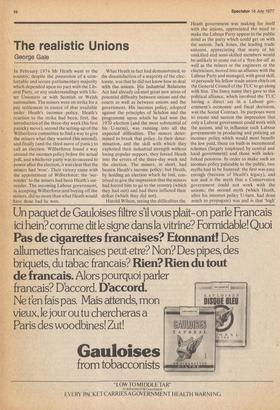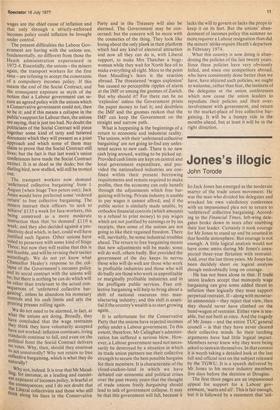The realistic Unions
George Gale
In February 1974 Mr Heath went to the country, despite the possession of a comfortable and secure parliamentary majority which depended upon no pact with the Liberal Party, or any understandings with Ulster Unionists or with Scottish or Welsh nationalists. The miners were on strike for a pay settlement in excess of that available under Heath's incomes policy. Heath's reaction to the strike had been, first, the introduction of the three-day week (his first panicky move), second the setting-up of the Wilberforce committee to find a way to give the miners what they wanted (his second), and finally (and the third move of panic) to call an election. Wilberforce found a way around the incomes policy before the actual poll, and whichever party was to succeed to power after the election, it was clear that the miners had 'won'. Their victory came with the appointment of Wilberforce: the 'surrender' to the miners had been Heath's surrender. The incoming Labour government, in accepting Wilberforce and buying off the miners, did no more than what Heath would have done had he won.
What Heath in fact had demonstrated, to the dissatisfaction of a majority of the electorate, was that he did not know how to deal with the. unions. His Industrial Relations Act had already created great new areas of potential difficulty between unions and the courts as well as between unions and the government. His incomes policy, adopted against the principles of Selsdon and the programme upon which he had won the 1970 election (and the most substantial of his U-turns), was running into all the expected difficulties. The miners determined to break that policy. In their determination, and the skill with which they exploited their industrial strength without losing popular support, they forced Heath into the errors of the three-day week and the election. The miners, in short, had beaten Heath's income policy; but Heath, by holding an election which he lost, contrived to give the impression that the miners had forced him to go to the country (which they had not) and had there inflicted their defeat (which they did not).
Harold Wilson, seeing the difficulties the Heath government was making for itself with the unions, appreciated the need to make the Labokur Party appear in the public mind as the party which could get on with the unions. Jack Jones, the leading trade unionist, appreciating that many of his unskilled and semi-skilled members would be unlikely to come out of a 'free-for-all' as well as the miners or the engineers or the electricians, moved into an alliance with the Labour Party and managed, with great skill, to persuade his fellow trade union chiefs on the General Council of the TUC to go along with him. The fancy name they gave to this political alliance, which involved the TUC having a direct say in a Labour government's economic and fiscal decisions, was the Social Contract. Its purposes were to create and sustain the impression that only a Labour government could work with the unions, and to, influence such Labour governments in producing and policing an incomes policy which would most benefit the low paid, those on built-in increMental schemes (largely employed by central and local government) and those with indexlinked pensions. In order to make such an incomes policy palatable to the public, two myths had to be fostered: the first was easy enough (because of Heath's legacy), and was and is the myth that a Conservative government could not work with the unions; the second myth (which Heath, after his incomes policy U-turn, had done much to propagate) was and is that 'high' wages are the chief cause of inflation and that only through a strictly-enforced incomes policy could inflation be brought under control.
The present difficulties the Labour Government are having with the unions are, fundamentally, no different from those the Heath administration experienced in 1972-4. Essentially, the unions—the miners again, the transport workers for the first time — are refusing to accept the constraints of a compulsory incomes policy. If this means the end of the Social Contract, and the consequent exposure as myth of the notion that a Labour government can secure an agreed policy with the unions which a Conservative government could not, then so be it; and if this means a collapse in the Public's support for Labour then, the unions are saying, that is just too bad. No doubt the politicians of the Social Contract will piece together some kind of tatty and tattered document which they will present as a joint approach and which some of them may claim to prove that the Social Contract still lives; but the fact is that last week's union Conferences have made the Social Contract extinct. It is as dead as the dodo; but the darling bird, now stuffed, will still be trotted out.
The transport workers now demand 'unfettered collective bargaining' from 1 August (when Stage Two peters out); Jack Jones would have preferred some 'ordered return' to free collective bargaining. The miners instruct their officers `to seek to achieve' 135 a week for face-workers, this being construed as a more moderate instruction than that `to demand' £110 a week; and they also decided against a productivity deal which, in fact, could well have justified such figures. Other unions have voted to persevere with some kind of Stage Three; but now they will realise that this is not feasible, and will be revising their tactics accordingly. We do not yet know what Chancellor Healey's response to the collapse of the Government's incomes policy and its social contract with the unions will be; but there is nothing he can do which will be other than irrelevant to the actual consequences of 'unfettered collective bargaining', unless he abandons his monetary controls and his cash limits and sets the Printing presses rolling again.
We do not need to be alarmed, in fact, at What the unions are doing. Broadly, they have concluded that the wage restraints they think they have voluntarily accepted have not worked: inflation continues, living standards continue to fall, and even on the Political front the Social Contract delivers no votes. Why, then, should they continue to act unnaturally? Why not return to free collective bargaining, which is what they do naturally?
,. Why not, indeed. It is true that Mr Maudlin& for instance, as a leading and consistent exponent of incomes policy, is fearful of !,he consequences; and I do not doubt that t. he Liberal collectivists and those who still think along his lines in the Conservative
Party and in the Treasury will also be alarmed. The Government may be concerned: but the concern will be more with the cosmetics of the thing. They look like losing about the only plank in their platform which had any kind'of electoral attraction and now all they can do is, with Liberal support, to make Mrs Thatcher a bogywoman while they wait for North Sea oil to make everything all right. More to the point than Maudling's fears is the reaction abroad. The threatened 'wages explosion' has caused no perceptible ripples of alarm at the IMF or among the gnomes of Zurich. But why should it? For there can be no 'explosion' unless the Government prints the paper money to fuel it; and doubtless the IMF and the gnomes reckon that the IMF can keep the Government on the straight and narrow path.
What is happening is the beginnings of a return to economic and industrial reality. The unions, with their `unfettered collective bargaining' are not going tcr find any unfettered access to new cash. There is no new cash lying around, waiting to be picked up. Provided cash limits are kept on central and local government expenditure, and provided the nationalised industries are confined within their present borrowing requirements and remain required to make profits, then the economy can only benefit through the adjustments which free bargaining will bring. Private industry is unable to pay wages it cannot afford; and if the public sector is similarly made unable, by orthodox financial controls (which amounts to a refusal to print money) to pay wages which are not justified by earnings or by tax receipts, then some of the unions are not going to like their regained freedom. There will, inevitably, be some industrial troubles ahead. The return to free bargaining means that new adjustments will be made: some will do well, others badly. But provided the government of the day keeps its nerver those who will do well are those who work in profitable industries and those who will do badly are those who work in unprofitable or marginally profitable industries and in the profligate public services. Free collective bargaining will help to bring about a shift of national resources into manufacturing industry; and this shift is essential if the country's wealth is to start growing again.
It is unfortunate for the Conservative Party that the unions have rejected incomes policy under a Labour government. To this extent, therefore, Mr Callaghan's administration has suffered a serious blow. However, a Labour government need not necessarily be destroyed by a situation in which its trade union partners use their collective strength to secure the best possible bargains for their members. It is characteristic of the cloud-cuckoo-land in which we have debated our economic and political crises over the past twenty years that the thought of trade unions freely bargaining should lead to talk of government collapse. It may be that this government will fall, because it lacks the will to govern or lacks the props to keep it on its feet. But the unions' abandonment of incomes policy this summer no more requires a Labour resignation than did the miners' strike require Heath's departure in February 1974.
What this country is now doing is abandoning the policies of the last twenty years. Since these policies have very obviously failed, and since our competitors abroad, who have consistently done better than we have, have abjured such policies, we ought to welcome, rather than fear, the instincts of the delegates at the union conferences which now cause the union leaders to repudiate their policies and their overinvolvement with government, and return to the market-place of free collective bargaining. It will be a bumpy ride in the months ahead, but at least it will be in the right direction.



































 Previous page
Previous page